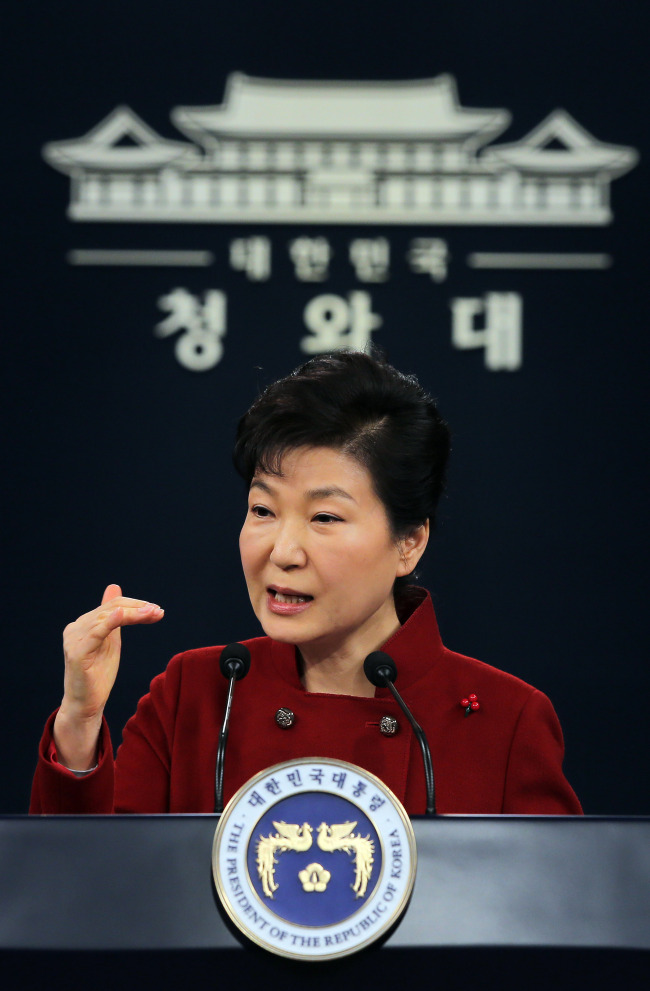President Park Geun-hye pledged Wednesday to impose stricter sanctions against North Korea for its recent nuclear bomb test that will include U.N. Security Council’s “strong and comprehensive” embargos on the reclusive regime’s finance and trade.
 |
| President Park Geun-hye speaks at a New Year’s press conference at Cheong Wa Dae, Wednesday. Yonhap |
Speaking in her national address followed by a press conference, Park also stressed the looming crises on security and economic fronts, urging political parties to pass the pending bills on terrorism prevention and labor reforms.
“National security and economy are the two key axes that sustain a country, but we are now facing an emergency situation in which both are at risk,” the president said in a televised event that ran for about 90 minutes.
North Korea, the economy and reform were the main focuses of her speech, while Park also took time to criticize the National Assembly for idling.
Regarding North Korea’s Jan. 6 nuclear test, the president said reinforced international sanctions are needed to impact the communist state and prodded China to play a more aggressive role.
“(The government) will make all diplomatic efforts to ensure that the UNSC adopts a powerful new resolution that may actually push North Korea to change its actions,” Park said.
As the communist state has been under U.N. sanctions for its three previous nuclear tests, a mere reiteration of past restrictions will not be sufficient this time, according to the president.
“China has repeatedly pledged to stamp out North Korea’s nuclear weapons,” she said.
“But unless such determination is transferred into action, there will continue to be other nuclear tests that impede on the peace of the Korean Peninsula, and China is well aware of this.”
China, in response to North Korea’s nuclear test, has reiterated a set of basic principles such as denuclearization and communication, but refrained from mentioning actual sanctions. The fact that Chinese President Xi Jinping has not returned Park’s calls in the wake of the nuclear test led to skeptic views on the bilateral ties of the two countries.
“A good partner is one that would hold the other’s hand in times of difficulty. … We believe that China will henceforth play its expected role as a permanent member of the UNSC,” Park said.
Park also said the deployment of the U.S.’ THAAD missile defense system to South Korea would be reviewed in consideration of the North’s nuclear and missile threat.
While acknowledging the calls to bring U.S. nuclear weapons as a defense against Pyongyang, the president maintained the “nuclear-free” policy for the Korean Peninsula.
The state leader cited the North Korean factor to defend the series of bills that have been pending at the National Assembly amid partisan disagreement.
“In order to respond to the potential attacks from North Korea or other terrorist organizations, the legislation of the terrorism prevention law is absolutely necessary,” she said.
The president also spared a large part of her speech for economic reforms, focusing on how to boost employment.
“The five pending labor-related bills are improvement plans to create jobs for youths and strengthen the social safety network,” she said.
Park suggested the government and the labor compromise on the two most disputed bills that involve expanding the scope of dispatched workers and extending the maximum period of temporary workers.
As an option, Park suggested the government to hold off on the bill regarding temporary workers for further discussion in return for the laborers to consent to enlarging the scope of dispatched workers that would include placing senior job seekers at small and medium-sized companies.
The president also reiterated her stance on the diplomatic agreement with Japan on the surviving wartime sex slaves.
“Past administrations have failed to properly address this difficult issue over the past 24 years,” she said of the Dec. 28 deal that is vehemently opposed by civic groups and the surviving victims.
Seoul and Tokyo had verbally agreed to settle the issue with Japan’s apology, admittance of military involvement and a creation of a 1 billion yen ($8.5 million) fund to compensate the victims. The protesters claim that the agreement made without prior consultation with the directly involved parties lack legal and ethical validity.
“(The current administration) deserves some credit for drawing the best possible result from such a tricky situation,” Park said, noting that the elderly survivors are not given much time.
“With little time on our hands, the top priority and most realistic task is to restore their dignity while they are still alive.”
Park’s address was attended by Cheong Wa Dae’s chief secretaries and some 130 members of local and overseas press.
By Bae Hyun-jung(tellme@heraldcorp.com)

